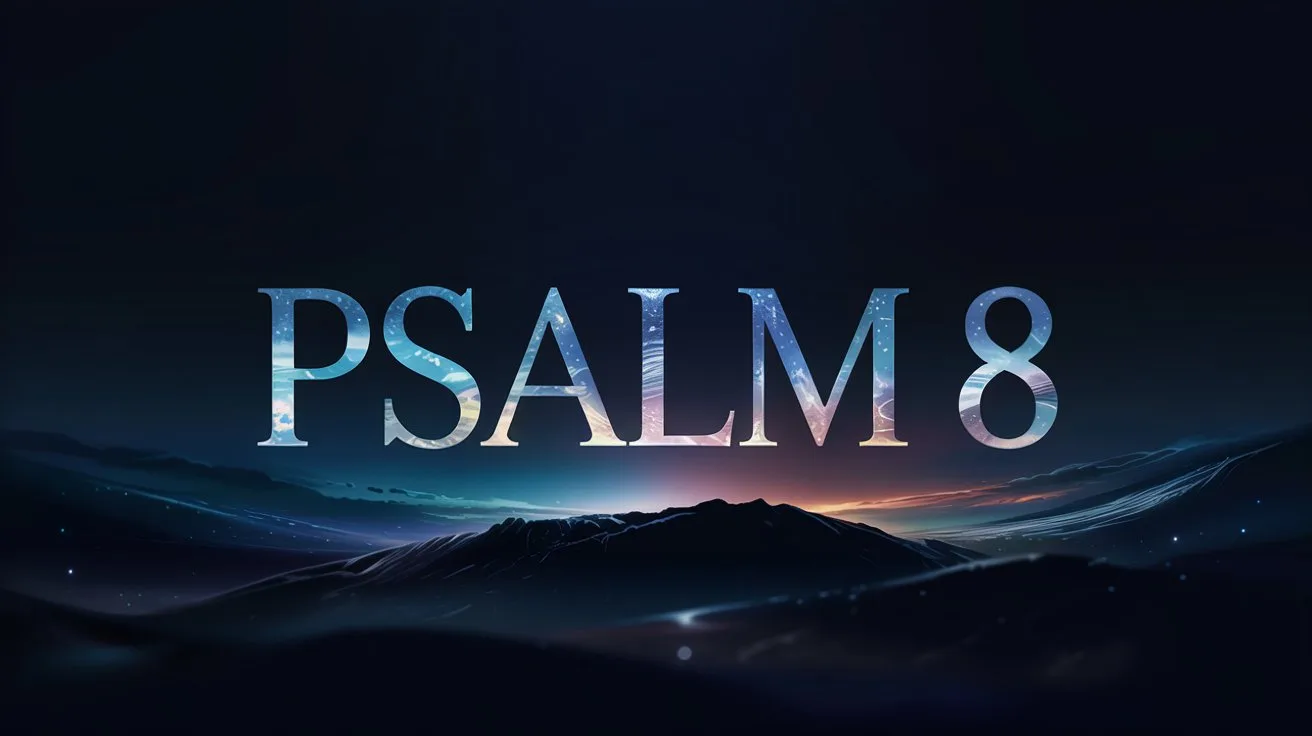Psalm 8 is a Psalm of David, as the inscription clearly states: “To the Chief Musician. On the instrument of Gath. A Psalm of David.” David, the shepherd-king, wrote many of his Psalms under the open sky, and this one reflects the awe of a man who often looked into the heavens with wonder and humility. While we don’t have a definitive date, it was likely written during David’s early years, possibly during his time as a shepherd when he had many quiet nights under the stars to reflect on God’s grandeur and his own smallness.
The Theme of Psalm 8
The major theme of Psalm 8 is the majestic glory of God revealed in creation and His gracious condescension toward man. It explores the paradox that while God is so great and vast, He still cares deeply for humanity. It contrasts divine majesty with human humility, and yet human dignity with divine intention.
Verse-by-Verse Walk Through
Psalm 8:1
“O LORD, our Lord, How excellent is Your name in all the earth, Who have set Your glory above the heavens!”
David begins with praise. LORD in all caps is YHWH, the covenant name of God. Our Lord implies personal relationship and recognition of His rule. The phrase “excellent is Your name” means His reputation, character, and authority are unmatched. His glory is above the heavens (beyond what creation can even contain).
Cross References:
Psalm 113:4, “The LORD is high above all nations, His glory above the heavens.”
Isaiah 6:3, “Holy, holy, holy is the LORD of hosts; The whole earth is full of His glory!”
Psalm 8:2
“Out of the mouth of babes and nursing infants You have ordained strength, Because of Your enemies, That You may silence the enemy and the avenger.”
This verse shows that God’s strength is revealed even through weakness. Jesus quoted this in Matthew 21:16 after children praised Him in the temple, affirming that even the least are capable of declaring divine truth. The idea is that God’s greatness is not upheld by the strong, but revealed through the humble.
Cross Reference:
1 Corinthians 1:27, “But God has chosen the foolish things of the world to put to shame the wise.”
Psalm 8:3-4
“When I consider Your heavens, the work of Your fingers, The moon and the stars, which You have ordained, What is man that You are mindful of him, And the son of man that You visit him?”
David is overwhelmed by the scale of creation. “Work of Your fingers” speaks to the ease with which God creates; it’s not strenuous for Him. In contrast, man seems so small. Mindful (Hebrew: zakar) means to give thought to, and visit (Hebrew: paqad) means to care for or attend to. This reveals God’s intimate concern for mankind, despite our apparent insignificance.
Cross References:
Job 7:17-18, “What is man, that You should exalt him, That You should set Your heart on him?”
Hebrews 2:6-8 quotes this to speak of Jesus’ incarnation.
Psalm 8:5
“For You have made him a little lower than the angels, And You have crowned him with glory and honor.”
This verse reflects the dignity God has bestowed upon man. The word “angels” is elohim in Hebrew, which can refer to God or heavenly beings. In context, it speaks of the lofty place man holds in creation (not equal to God, but exalted above beasts).
Cross References:
Genesis 1:26, “Let Us make man in Our image, according to Our likeness.”
Hebrews 2:9 applies this to Jesus: “But we see Jesus, who was made a little lower than the angels, for the suffering of death…”
Psalm 8:6-8
“You have made him to have dominion over the works of Your hands; You have put all things under his feet, All sheep and oxen—Even the beasts of the field, The birds of the air, And the fish of the sea That pass through the paths of the seas.”
This mirrors Genesis 1:28. God gave Adam dominion over creation. David recognizes that the authority given to mankind is not earned, but granted. Spiritually, this dominion finds its perfection in Christ, who has all things under His feet (1 Corinthians 15:27).
Cross References:
Psalm 115:16, “The heaven, even the heavens, are the LORD’s; But the earth He has given to the children of men.”
1 Peter 3:22, “Jesus Christ… who has gone into heaven and is at the right hand of God, angels and authorities and powers having been made subject to Him.”
Psalm 8:9
“O LORD, our Lord, How excellent is Your name in all the earth!”
The Psalm ends as it began: in doxology. All that was said in the middle leads back to worship. The repetition signifies that everything (man, nature, dominion, and dignity) serves the purpose of glorifying God’s name in all the earth.
My Final Thoughts
Psalm 8 is a treasure that reminds us we are both small and significant. Small in that we are just dust under a sky filled with stars, but significant because God has crowned us with honor and entrusted us with stewardship. And even more, He came down, made Himself even lower than us, to lift us up in glory. Christ is the perfect fulfillment of this Psalm. He is the Son of Man who was made lower, suffered death, and is now crowned with glory and honor. In Him, we see what man was meant to be, and what we will be in glory.
Let this Psalm anchor us in humility and lift us in hope. We’re not cosmic accidents. We are chosen, visited, crowned, and sent to glorify His excellent name.





 Get the book that teaches you how to evangelize and disarm doctrines from every single major cult group today.
Get the book that teaches you how to evangelize and disarm doctrines from every single major cult group today.